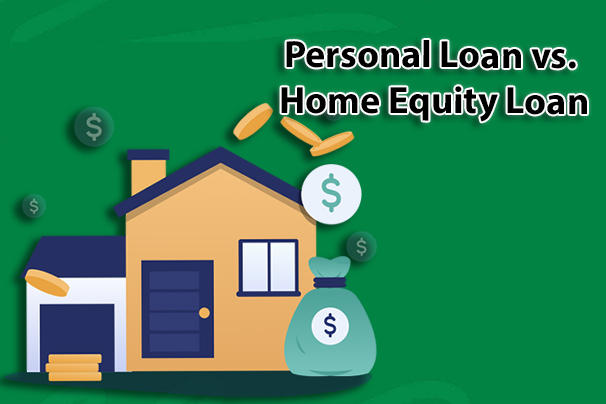Personal Loan vs. Home Equity Loan: What’s the Difference? Are you in search of a way to consolidate high-interest debt or a way to tackle home improvement projects? If yes, then there are a lot of funding options available for you. The two most common ways to loan money are personal loan vs home equity loan. They both provide former, lump-sum payments that need to be paid back in installments over a contract time.

Personal loan vs home equity loan also have differences. As a home equity loan, you need to be a homeowner, and the amount you can borrow will be determined by the value of your home in addition to your credit history. You could lose your home to foreclosure if you refuse to refund.
However, a personal loan doesn’t need you to put up collateral, with your credit score being causal for whether you will be accepted and the amount of money you can loan. The rates on personal loans are inclined to be more complex than on home equity loans. Now let’s quickly move straight into how both of these loan options work one after the other to assist you in determining which could benefit you.
What Are Personal Loans?
A personal loan is a type of loan that is unsecured and permits you to borrow from a lender without making use of any collateral. This loan is obtainable in almost all banks and credit unions. You can also make use of an online lender to get a personal loan. However, this type of loan gives a large option of repayment terms, interest rates, and loan amounts.
What Are Home Equity Loans?
A home equity loan is a type of loan that is secured and permits you as a homeowner to borrow against the equity in your home. This loan is secured by the property value, which differentiates it from an unsecured personal loan. A home equity loan amount is always based on the difference between the homeowner’s mortgage balance due and the home’s current market value.
Advantages and Disadvantages of Personal Loans
Personal loans have their work in one’s financial tool strap. They provide elasticity or flexibility and can be used for a lot of purposes. Nevertheless, they always come with higher interest rates and severe application supplies compared to other types of loans. Below are some breakdowns:
Advantages of personal loans
- Fixed interest rate: A lot of personal loans provide a fixed interest rate and installment payments, which makes the loan foreseeable and easy to issue into your budget.
- Usually no collateral required: A lot of personal loans are unsecured, which means that there is no collateral at risk if you do not refund the loan.
- Versatile: The money from a personal loan is offered for a large range of uses.
Disadvantages of personal loans
- Limited loan amount: You will be given a loan that is subject to your ability to refund. It is possible that you are limited in the amount you can loan based on your income.
- Need good credit: You can be eligible for a personal loan with less than good credit, but you may find it very hard. A credit score of 640 or above is advisable for you to have.
- Higher interest rate: The interest rate of a personal loan is higher than the one of a secured loan.
As seen above, the breakdown of an unsecured personal loan.
Advantages and Disadvantages of Home Equity Loans
Home equity loans have their own set of benefits and risks that make them outstanding. They provide possibly lower interest rates but with collateral. Let’s see the breakdown:
Advantages of a home equity loan
- Possible tax benefits: You may be eligible for a tax deduction on your loan interest, which all depends on how you make use of your funds.
- Potentially a substantial loan amount: A secured loan lets your loan amounts be much higher due to the collateral, most especially if you have much equity available. Lenders are not at risk due to the fact that they can sell what you bring as collateral if you fail to refund.
- Lower interest rate: Lenders typically bargain lower interest rates than other types of loans all because you are making use of your house to secure the loan.
Disadvantages of home equity loans
- Additional fees: Home equity loans come with closing costs and other fees, which reduce your offered funds.
- Reduces equity: This means that if anything happens to the value of your home, you can owe more than it’s worth. You will also need to pay back the loan by selling what you use as your collateral so that you can be left with just a little if you sell before paying back the loan.
- Risk to your home: If you refuse to refund the loan, lenders can seize your property, and you can lose your home.
As seen above, the breakdown of a secured personal loan.
Personal Loan vs. Home Equity Loan: What’s the Difference?
The main difference between a personal loan vs home equity loan is that a personal loan is unsecured while a home equity loan is secured. But aside from that, a personal loan is an unsecured loan and a home equity loan is a secured loan; there are still differences in their borrowing amounts, rates, and qualification requirements.
| Personal loans | Home equity loans | |
| Rate | 6% to 36%. | The average range is 4% to 8%. |
| Loan amount | $1,000 to $100,000. | Up to 80% of your home’s value, minus your outstanding mortgage. |
| Repayment terms | 2 to 7 years. | Up to 15 years. |
| Secured or unsecured | Typically, unsecured. | Secured by your home. |
| Credit score requirements | Minimum 560; higher scores are more likely to qualify. | Minimum of 620. |
Final Thought
Personal loans can have lower interest rates than credit cards, depending on loan type, length, and borrower’s credit history. Home equity loans can have rates ranging from 6% to 36%, while personal loans can be as low as 1.89%. Many personal loans allow early repayment without consequences, saving on interest costs.



